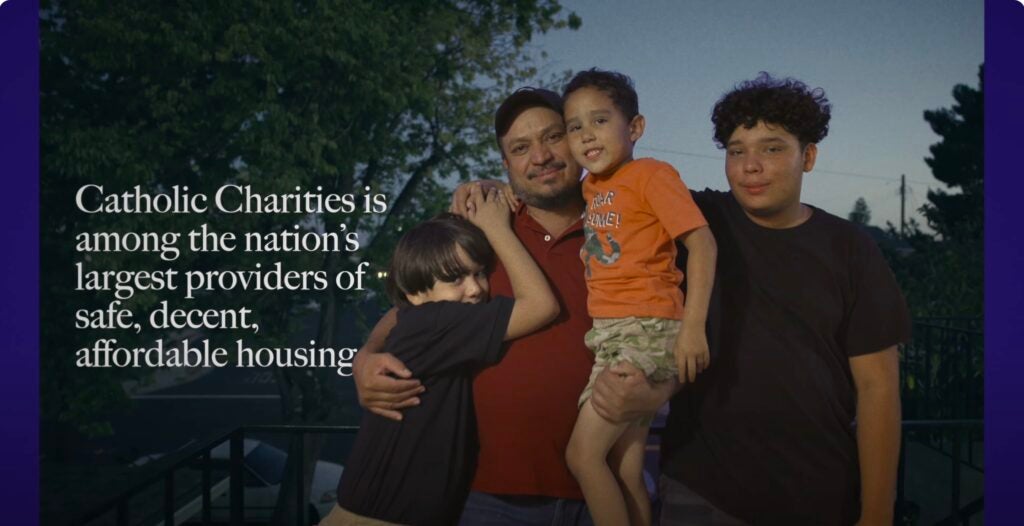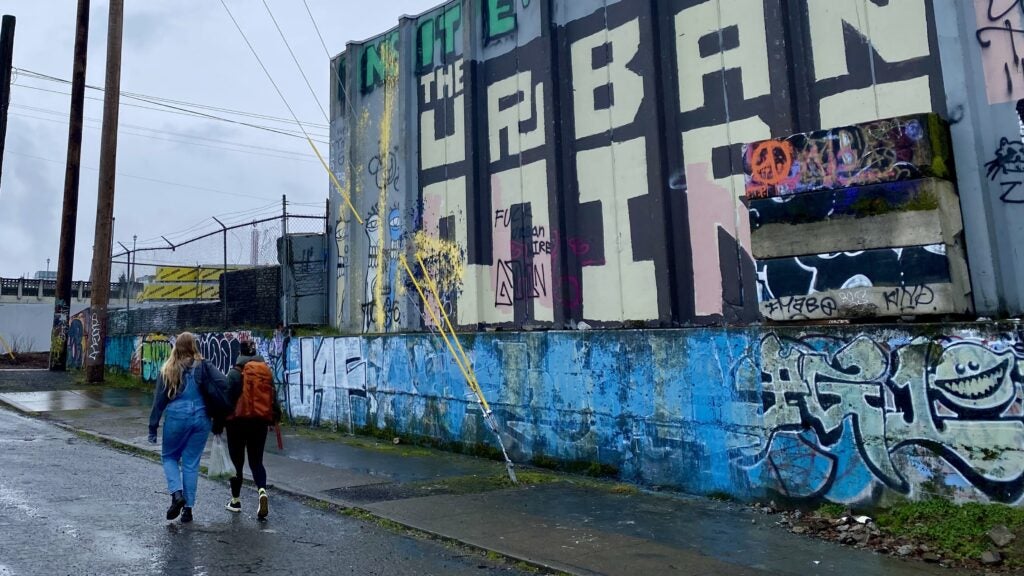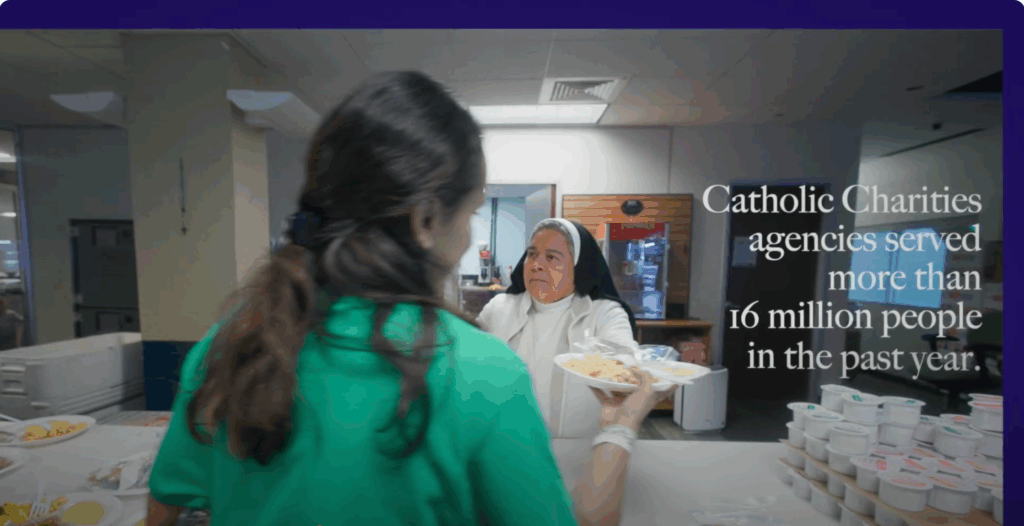

Outreach to homeless campers saves lives, builds relationships, offers a path to housing
Splayed on cold damp cement, the man’s face was quickly turning grey. A woman’s screams for help echoed off the brick buildings of Portland’s Old Town.
Honor Hehn and Kathryn Swanson, Catholic Charities of Oregon outreach workers, were picking up supplies for their visits to homeless camps when they heard the pleas from the woman, who was alerting the world that her friend had overdosed.
Hehn and Swanson rushed to their vehicle for the Narcan doses purchased through a grant from the nonprofit Save Lives Oregon. The pair held the unconscious man’s head and shot a dose up his nose. He sputtered to consciousness and now has a chance to make better choices for his life.
Resuscitation is not an everyday event for Catholic Charities workers. But just a few months prior, Hehn and Swanson had saved a homeless man who was suffering in his tent with an acute, life-threatening intestinal illness. The pair of workers called for an ambulance and waited with the man until medics arrived.
Catholic Charities of Oregon workers aren’t waiting around their offices for people in need to come to them. Instead, trained teams go regularly into the streets of Portland to offer water, food, tents, sleeping bags, first aid supplies and toiletries along with invitations to begin the move toward shelter and housing.
“People really appreciate the lunch sacks,” said Hehn. There are few meal sites on Portland’s east side. The workers also hand out what they call “life kits” that include wipes, a flashlight, garbage bags, snacks and a resource list.
As important as the supplies and social services are, Catholic Charities outreach workers also provide people who are homeless a chance at a steady human connection. On the streets, isolation can be deadly.
“We build relationships with people,” says Victoria Waldrep, program manager for Catholic Charities’ Homeless and Transitional Housing Services. “I’ve had people call out of their tents and say, ‘Is that you, Victoria?’ Then they come out and throw their arms around me.”
Waldrep says that being a regular presence is vital. For years, Catholic Charities teams have kept to a firm schedule. “People like that,” Waldrep explains.
On occasion, homeless campers ask for prayers, which the workers are happy to supply. Outreach teams spend 20 person hours per week on the streets. They encounter 50 or 60 people each week, offering supplies and assessing needs.
Catholic Charities provides case management and housing plans for single, childless, self-identified women 25 and older who are homeless. But outreach workers visit everyone.
The 90-year-old nonprofit focuses on a few areas east of the Willamette River with large populations of people who are homeless, such as inner Southeast, including the zone around St. Francis Parish and the East Bank Esplanade. The teams also venture north into the Hollywood District.
The first rule for outreach workers is to operate with utmost respect.
As the team approaches a camp, the leader calls out from a distance, “Good morning! Outreach workers!” In loud places, such as under bridges, the greetings need to be downright hollers. But it’s always done with deference.
Workers announce that they have lunch sacks and life kits and other items, including sleeping bags, if they’re in supply. If there is no response, the team moves along.
“You would not just walk into somebody’s home,” said Waldrep.
If someone does respond and emerge from a tent, the workers chat in a friendly way and see if they have any needs.
“Someone might want to tell their story and talk a little,” says Hehn. One man recently sang the workers a song he wrote.
On the streets, there is a strong internal sense of justice. It’s very humbling to see the generosity among campers. They share. People look out for others around them. Or people point out that ‘someone over there needs your help .’
Victoria Waldrep, program manager for Catholic Charities’ Homeless and Transitional Housing Services
If the person is a woman who meets the Housing Transitions requirements, the workers describe the program and offer a card. Campers may ask general questions about surviving on the streets, so outreach workers need to stay up to date on what’s available, including showers, internet and laundry.
Staff have learned that people are homeless for many reasons, not just drugs and mental illness. One man lost his house in a fire. Often, women who are homeless lost a place to live after being a caretaker for a parent or other loved one who died.
It’s no surprise that chief among the needs outreach workers identify is housing – there is not nearly enough of it in Portland. Catholic Charities owns 1,200 affordable units and is developing more.
Inevitably, staff are most impressed by the team spirit shown by people who are homeless.
“On the streets, there is a strong internal sense of justice,” says Waldrep. “It’s very humbling to see the generosity among campers. They share. People look out for others around them. Or people point out that ‘someone over there needs your help.’”
“One week a guy told us that 10 blocks away a man needed medical help,” says Hehn.
It’s dangerous to sleep outside alone, so individuals often stay with other people, forming tight-knit street families. People may refer to others as their “street brother” or “street mom,” and these relationships can be as strong as or stronger than blood relations.
Swanson, who grew up in Montana, had not witnessed much homelessness. In her town, she knew of just one guy. So Portland was something new, and Swanson had to adjust to seeing hundreds of people who are homeless. But now, she and other workers are more afraid of speeding motorists and loose dogs than of people who live on the streets.
“I have had very pleasant interactions so far every time we go out,” says Hehn. “People want the supplies we have. And they notice that we are non-threatening and respectful of their space.”
That said, Catholic Charities workers do always go out in groups of two or three. During interactions, one person is charged with keeping an eye on the perimeter in case any interlopers sneak up from behind. Once, a man appeared with a knife and large stick. The outreach worker spoke to him in a non-threatening way, and the interaction turned into a positive moment.
Waldrep sums up the work, both the joys and perils: “We are not there to bother people. We are there to be in solidarity with them and show care.”
Natalie Wood, executive director of Catholic Charities of Oregon, said the outreach workers serve people as they are and hope to accompany them through positive change.
“We realize many people we meet have gone through trauma,” said Wood. “Our hope is that we can meet them in their pain and disillusionment and show them we care. Steadfast love is what transforms people.”
Ed Langlois, communications director for Catholic Charities of Oregon, submitted this story.








